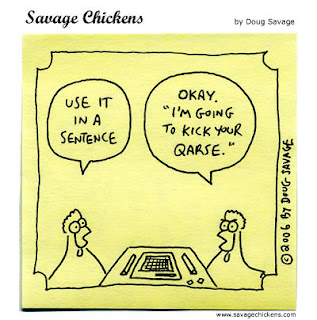You've had one semester of this undergraduate thing...
Tips for the Terrified
 computing
computinglanguages
maths
presentations
writing
Some people have a real phobia about the above areas, either because of bad experiences at school, or because they have never done them before. Here, if you need them, are a few basic tips to get you started. Beyond that, seek help from your teacher/trainer or find out if there are any courses or workshops you can enrol on. This is only a beginning…
Computing
- Find someone to show you. Manuals and help-screens are often as complicated as the program itself, though your institution may have produced a simple guide.
- Ask him or her to slow down. Computer people tend to do things too quickly.
- Make sure you can get out of situations as well as into them. Always ask: how do I get back to where I was?
- Keep a little notebook beside you and write down your own instructions. That way you will understand them properly.
- Practise each operation two or three times to make sure you can really perform it.
- Take your time. Speed is not important.
- Don’t worry, you won’t break it.
- Work at it regularly, otherwise you will forget.

Languages
- Do a little often rather than a lot occasionally.
- Take risks. You will make mistakes but you will learn from them.
- Listen to tapes to get your ear attuned.
- Read vocab lists three times: top down, bottom up and top down again. Then test yourself. If the list has more than 10–12 items, divide it in half and do the same.
- Try imagining one change when you write or speak a sentence (present to past, statement to question, singular to plural, male to female, different adjective, etc). That way you will learn how to vary the patterns.
- Keep an error book. Note down any repeated mistakes you make and cross them out when you no longer do.
- Check your work before you hand it in.
- Have a go.

Maths
- In maths, if you do it right, you get it right.
- Make sure you understand every little step. Don’t skip or gloss over
- anything.
- Make sure you are doing things in the right order.
- Keep an error log of the mistakes you make. Cross them out when you no longer do.
- Try to grasp the underlying principles rather than just jumping through hoops. If you don’t, ask, and if you still don’t, ask again.
- Understand the purpose of it. Otherwise maths is just meaningless procedures.
- Take your time. Except in some exams, speed is not important.
- Check your workings. It is easy to make a slip.
- Get a feel for the solution. Does it look right?

Presentations
- Don’t put too much in. Maximum three key points in five minutes, five in ten minutes.
- Keep a little bit in reserve near the end in case you look like running out.
- List your main points at the start, preferably on a transparency; make the writing large enough; if you can’t write clearly, print.
- Speak, don’t read. Have clear, large notes you can see at a glance, maybe on a card.
- Project your voice and don’t drop it at the ends of sentences.
- Look at people, and not just the front row.
- If you want to get a discussion going, present conflicting views.
- Provide a handout at the end that summarises it all.
- Have your final sentence worked out so that you exit gracefully.

Writing
- Make an outline of your essay/assignment first and leave it for a day or so.
- Say what you are going to say in the introduction.
- Build up your writing in paragraphs. State your main point at the beginning and then develop it through examples, evidence, questions, arguments and counter-arguments.
- Don’t feel that the writing must be complicated just because it is an essay. Think: how would I explain this to someone?
- Don’t let your sentences get too long or you may lose track of them.
- If you are unsure about spelling, buy a compact dictionary and check.
- Read a lot. It helps all other communication skills.
- Don’t try to come to a firm conclusion if there isn’t one.

x
No comments:
Post a Comment